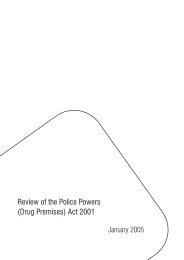Review of the Police Powers (Drug Detection Trial) Act 2003 - NSW ...
Review of the Police Powers (Drug Detection Trial) Act 2003 - NSW ...
Review of the Police Powers (Drug Detection Trial) Act 2003 - NSW ...
You also want an ePaper? Increase the reach of your titles
YUMPU automatically turns print PDFs into web optimized ePapers that Google loves.
This view was echoed by <strong>of</strong>ficers consulted by <strong>the</strong> <strong>Police</strong> Association <strong>of</strong> <strong>NSW</strong>:<br />
Information provided by members indicates that <strong>the</strong> forced consultation with <strong>the</strong> RTA has <strong>the</strong> potential to<br />
compromise <strong>the</strong> integrity <strong>of</strong> <strong>the</strong> authorisation. There is no longer a control over <strong>the</strong> information by police once it<br />
is disseminated to <strong>the</strong> RTA. If in fact <strong>the</strong> integrity <strong>of</strong> <strong>the</strong> authorisation is compromised, this may in turn hinder <strong>the</strong><br />
deployment <strong>of</strong> surprise tactics by police and affect <strong>the</strong> overall success <strong>of</strong> <strong>the</strong> operation. 376<br />
We are not aware <strong>of</strong> any evidence suggesting that <strong>the</strong> integrity <strong>of</strong> any operation was compromised. In practice, <strong>the</strong><br />
consultation between police and RTA regional traffic managers usually involves a phone conversation to discuss<br />
potential safety issues that police might encounter during <strong>the</strong> planned operation. The details <strong>of</strong> <strong>the</strong> conversation are<br />
<strong>the</strong>n recorded in a statement which is attached to <strong>the</strong> application for authorisation. 377<br />
In our view, <strong>the</strong> consultation requirement is prudent given <strong>the</strong> capacity for RTA <strong>of</strong>ficers to provide expert advice and<br />
guidance on safety and traffic management strategies. In addition, RTA <strong>of</strong>ficers are best placed to appreciate <strong>the</strong><br />
nature and location <strong>of</strong> any proposed road works or o<strong>the</strong>r events that could potentially impact on <strong>the</strong> operation.<br />
5.5.4.6. Onerous record keeping and reporting requirements<br />
We received mixed views about <strong>the</strong> record keeping and reporting requirements. On <strong>the</strong> one hand, one senior <strong>of</strong>ficer<br />
opined that <strong>the</strong> record keeping and recording requirements were no more onerous than information collected during<br />
random breath testing operations or search warrant executions. 378<br />
On <strong>the</strong> o<strong>the</strong>r hand, <strong>the</strong> <strong>Police</strong> Association <strong>of</strong> <strong>NSW</strong> advised that <strong>of</strong>ficers felt <strong>the</strong> record keeping and reporting<br />
requirements in <strong>the</strong> <strong>Drug</strong> <strong>Detection</strong> <strong>Trial</strong> <strong>Act</strong> (see paragraph 2.1.9) were onerous and time consuming, resulting in <strong>the</strong><br />
diversion <strong>of</strong> police resources away from fighting crime and serving <strong>the</strong> community. 379<br />
In addition, <strong>the</strong> <strong>NSW</strong> <strong>Police</strong> Force stated:<br />
… <strong>the</strong> requirement to now provide a report on <strong>the</strong> conduct <strong>of</strong> a [drug detection trial] operation within 14 days<br />
after <strong>the</strong> expiry <strong>of</strong> an authorisation has created additional work. 380<br />
However, we note that <strong>the</strong> Border Areas <strong>Trial</strong> <strong>Act</strong> also contained a report back requirement. 381<br />
5.5.5. Occupational health and safety obligations<br />
Ensuring <strong>the</strong> safety <strong>of</strong> police <strong>of</strong>ficers and members <strong>of</strong> <strong>the</strong> public, which is mandated by <strong>the</strong> <strong>Drug</strong> <strong>Detection</strong><br />
<strong>Trial</strong> <strong>Act</strong> 382 and occupation health and safety legislation, 383 is <strong>of</strong> paramount concern for police conducting drug<br />
detection operations.<br />
These obligations have <strong>the</strong> potential to impact on <strong>the</strong> effectiveness <strong>of</strong> drug detection operations as <strong>the</strong>y may<br />
restrict <strong>the</strong> times, locations and manner in which police are able to safely perform <strong>the</strong>ir duties. The following<br />
comments illustrate some <strong>of</strong> <strong>the</strong> occupational health and safety (‘OH&S’) challenges faced by police:<br />
I think a lot <strong>of</strong> it comes down to your OH&S … you can’t have police trying to pull up big trucks in <strong>the</strong> middle<br />
<strong>of</strong> <strong>the</strong> night on <strong>the</strong> highway. 384<br />
Due to OH&S concerns during darkness areas outside built up areas are not suitable to conduct <strong>the</strong>se trials. 385<br />
Three zones were authorized and all worked for a period <strong>of</strong> time during this operation. One <strong>of</strong> <strong>the</strong>se zones was<br />
within a semi built up area and serviced by street lighting, <strong>the</strong> o<strong>the</strong>r two being open highway without lighting.<br />
After OH&S assessments all operations were reverted to <strong>the</strong> built up area with lighting, open highways<br />
were found to be suitable for daylight hours only. 386<br />
An <strong>of</strong>ficer, quoted in <strong>the</strong> <strong>Police</strong> Association <strong>of</strong> <strong>NSW</strong> submission, opined:<br />
The legislation is poorly written in relation to directions we can and can’t give to drivers for <strong>the</strong> purpose <strong>of</strong><br />
screening and is in conflict with OH&S requirements to some degree and o<strong>the</strong>r legislation where police can<br />
direct a driver to do certain things. 387<br />
The Association observed:<br />
In relation to <strong>the</strong> screening, <strong>the</strong>re is a serious OH&S implication that requires fur<strong>the</strong>r consideration. As <strong>the</strong><br />
drivers <strong>of</strong> heavy vehicles (due to <strong>the</strong> sheer size <strong>of</strong> <strong>the</strong> vehicle) sit considerably high <strong>of</strong>f <strong>the</strong> ground in <strong>the</strong>ir<br />
cabins, police are unable to see <strong>the</strong>ir hands and hence when approaching <strong>the</strong>m, cannot be sure if <strong>the</strong>y have<br />
any dangerous weapons etc in <strong>the</strong>ir possession. Members are <strong>of</strong> <strong>the</strong> opinion that <strong>the</strong> legislation requires<br />
amendment so that police may have <strong>the</strong> power to make <strong>the</strong> drivers <strong>of</strong> heavy vehicles alight from <strong>the</strong>ir vehicle so<br />
that <strong>the</strong>y can be spoken to … 388<br />
68<br />
<strong>NSW</strong> Ombudsman<br />
<strong>Review</strong> <strong>of</strong> <strong>the</strong> <strong>Police</strong> <strong>Powers</strong> (<strong>Drug</strong> <strong>Detection</strong> <strong>Trial</strong>) <strong>Act</strong> <strong>2003</strong>

















